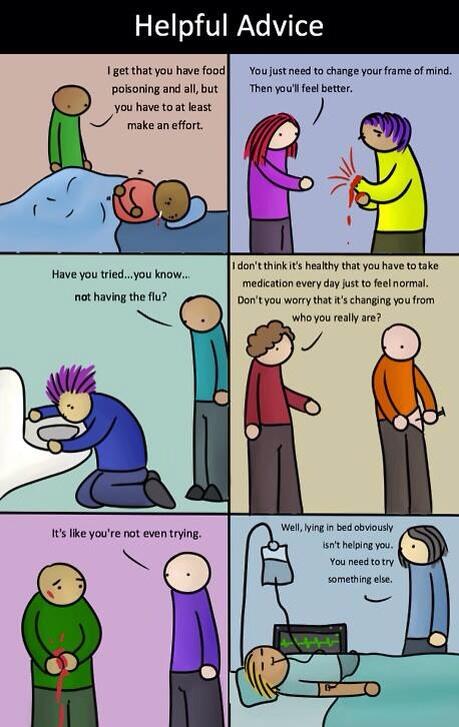As the sad departure of Jonathan Trott from the England Ashes tour in Australia has shown us over the past few weeks, we humans have a remarkable, if ill-advised way of ‘living’ with mental illness; of ‘dealing with it’. There is a popular misconception amongst some who feel that those who suffer from mental illness, specifically various forms of depression, should be able to ‘snap out of it’ or ‘pull themselves together’.
Of course, unlike other medical conditions, let’s say for example, a broken leg; depression / mental illness can not easily be seen – those affected will often find it hard to talk about how they feel or the problems they find even completing the most basic of day-to-day tasks that other people take for granted. It can be extremely hard to articulate ones feelings with regards to this; partly because of the stigma still attached to these conditions or due to embarrassment – feeling as if it’s not a ‘real’ illness.
It is – depression is no less an illness than developing pneumonia and is more common and widespread than many of us think. In 2010/11 the number of reported cases of depression in the UK fell just below 5 Million. This obviously doesn’t include the number of individuals who for various reasons either refuse or lack the ability or courage to seek treatment; or indeed those who do not in fact realise that they are in fact suffering from a form of mental illness.
Mental illness is a huge problem in the UK – it’s an illness that doesn’t discriminate; it can debilitate anyone, young or old; and despite the still popular misconceptions, succumbing to depression is not a sign of weakness or a flaw in an individual’s character. As Jonathan Trott has shown; here is a man attempting to live with a serious illness whilst still attempting to maintain a high level of performance as one of England’s leading batsmen. Of course, anyone attempting to lead a ‘normal’ life whilst attempting to keep their condition hidden or under control will face problems. Therefore the more we can do to highlight mental illness and to show support and understanding to those, like myself, who suffer, the sooner we can begin to break down the misguided barriers that help to contribute to making people’s basic every day survival potentially much harder than it really should be.
Depression can show itself in many forms, quite often the symptoms will be physical as well mental, as these examples show:
- Tiredness and loss of energy
- Persistent sadness
- Loss of self-confidence and self-esteem
- Difficulty concentrating
- Not being able to enjoy things that are usually pleasurable or interesting
- Undue feelings of guilt or worthlessness
- Feelings of helplessness and hopelessness
- Sleeping problems – difficulties in getting off to sleep or waking up much earlier than usual
- Avoiding other people, sometimes even your close friends
- Finding it hard to function at work/college/school
- Loss of appetite
- Loss of sex drive and/ or sexual problems
- Physical aches and pains
- Thinking about suicide and death
- Self-harm
Of course there is no particular pattern to this and no two people will suffer from the same combination of symptoms. I was finally forced to admit to and face my own problems recently after and during a severe bout of insomnia that lasted almost a month. To put that into perspective, during those four weeks I probably averaged about 1 to 2 hours sleep a night – as a general rule those periods of sleep came at the beginning of the night – the rest of the time was spent awake. I have suffered from mental illness for twenty years and whilst I don’t intend to go into the reasons or triggers for that here, I can confirm that for the majority of that time I have gone without both medication or therapy.
So, just for moment try to imagine the mindset and internal pressure of someone attempting to cope with mental illness, knowing full well that they have a problem, yet trying and failing to live a ‘normal’ life. I’ll be the first to admit that one becomes rather adept at covering up any traces of illness – during the whole of past twenty years I can honestly count on one hand the number of people who I have discussed my situation with and that includes doctors. Obviously I would urge anyone showing any of the above symptoms to contact their doctor immediately or at the very least try to discuss their problems with someone close to them. Of course, it is very, very easy for me to say this, after all I have become extremely skillful at NOT discussing my problems with ANYONE, and to be honest I couldn’t give you a good reason why. Again, I don’t intend to make this too personal, but what I will say is that by not seeking help a long time ago for this illness I have built a wall around myself that is so impenetrable that even I, now at the age of forty, almost fail to recognise myself.
If I could give one small piece of advice to anyone it would be ‘ don’t become isolated’. I have driven people away and ruined most of my close or meaningful relationships due to what at the time was my inability to confront or admit to myself that I had a problem – let’s put it down to my upbringing, stiff upper lip and all that other bullshit.
Should you be in that position – seek help. Talk to your doctor – I’m very lucky in that I’ve discovered that in fact I have the most wonderful doctor, who in the past month or so has made a huge difference to my life and has helped me to see a way forward and a way of not just coping, not just managing, but living a better and hopefully more meaningful life.
SSRIs are not for everyone, and after a painful and very frightening time taking Seroxat in my late twenties, I was very unwilling to go down that particular route again. However, I believe it is possible for the right combination to be prescribed although it might take some time to find the right medication for you, (if at all).
Cognitive Behavioural Therapy can also help. Keeping your feelings to oneself is the worst thing that you can do – there has to be an outlet, a way to let of steam, to release the pressure. Again, this might not be for everyone, but I am finding this to be a massive help. It can be very painful, however I feel that the benefits will pay off over the long-term.
Talk to people, friends, family and fellow sufferers – learn about your illness. It can be a long battle and you need to be as prepared and well equipped as possible. Know your enemy.There are plenty of support groups out there, full of people going through the same thing, seek them out.
Finally – this is NOT an illness to be embarrassed or ashamed about. It’s a real illness with millions of sufferers, many of whom are fighting the double battle of both mental illness and the stigma attached to it and to themselves.
http://www.depressionalliance.org/help-and-information/what-is-depression.php
http://www.nhs.uk/conditions/Cognitive-behavioural-therapy/Pages/Introduction.aspx
http://www.nhs.uk/conditions/ssris-(selective-serotonin-reuptake-inhibitors)/Pages/Introduction.aspx
 This week the Labour MP for Barrow and Furness, John Woodcock took a very brave decision to announce that he is suffering from clinical depression. Following this bold step, he has rightly received praise from all sides for his willingness to sick his head above the parapet and say ‘Me too’.
This week the Labour MP for Barrow and Furness, John Woodcock took a very brave decision to announce that he is suffering from clinical depression. Following this bold step, he has rightly received praise from all sides for his willingness to sick his head above the parapet and say ‘Me too’.





















































